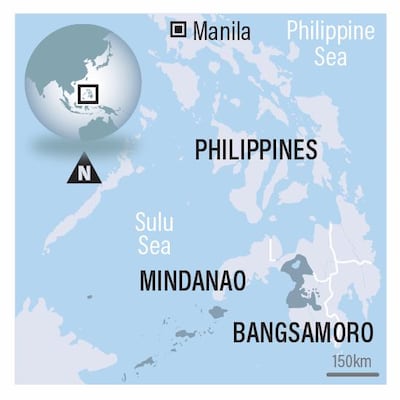Minority Muslims in the southern Philippines cast votes on Monday in a long-awaited referendum on autonomy, the culmination of a peace process to end decades of separatist conflict in a region plagued by poverty, banditry and Islamist extremism.
About 2.8 million people in the volatile Mindanao region are being asked if they back a plan by separatists and the government to create a self-administered area known as Bangsamoro, or "nation of Moros", referring to the name Spanish colonialists gave to the area's Muslim inhabitants.
The ballot was largely peaceful and turnout was large, according to election authorities,
A clear "yes" vote is widely expected, which would grant executive, legislature and fiscal powers to a region where more than 120,000 people died in a four-decade conflict that left it one of Asia's poorest and at risk of infiltration by radical groups.

The central government would continue to oversee defence, security, foreign and monetary policy, and appoint a transition authority run by the Moro Islamic Liberation Front, the separatist group expected to dominate the new set-up after a 2022 election.
"We are confident that 'yes' will win," chairman of the front Murad Ebrahim told CNN Philippines on Monday.
"If there is no manipulation, no intimidating, there will be overwhelming approval," he said.
Mohagher Iqbal, the MILF's top negotiator, said the vote would help to end violence in the region.
"It's a historic chapter in our long, long journey towards our right to self-determination, it's history in the making," Mr Iqbal said.
"Our hope is this will bring justice. Violent extremism won't thrive if there are no longer grievances with the government, it will have no support if there is no legitimacy.
"This will be a very, very important and hard won victory."
Success would be a much-needed boost for Philippine President Rodrigo Duterte, who remains a hugely popular personality among Filipinos but has so far struggled to make inroads on his ambitious policy agenda.
Although the Bangsamoro plan was negotiated by his predecessors, Mr Duterte, a mayor in Davao City in Mindanao for 22 years, is credited with ensuring it got the support of Congress – backing the previous administration was unable to secure.
A result is expected by on Friday after a manual vote count. A smaller plebiscite will be held on February 6 asking some other areas if they wish to join the newly endorsed entity, once created.
Mr Duterte last week urged voters to approve the plan and show they want peace, development and a local leadership that "truly represents and understand the needs of the Muslim people".
The plan's advocates say it would address what are the predominantly Catholic country's lowest levels of employment, income, education and development, which experts say are exploited by pirates, kidnapping gangs and armed groups that have pledged allegiance to ISIS.
_______________
Read more:
Explosion reported outside a mall in Cotabato, south Philippines
Catholic priest says life in danger for criticising President Duterte
Filipino troops kill 2 bomb couriers in south
_______________
The MILF has denounced extremists and said disillusionment over the slow progress towards devolution was a factor behind a 2017 occupation of Marawi City by rebels loyal to ISIS, which the military took five months of ground offensives and devastating air strikes to defeat.
The whole of Mindanao has since been under martial law.
The MILF and the government hope autonomy would lead to greater investment in infrastructure and natural resources, and allow for expansion of fruit and nickel exports and development of a palm oil industry.
While a "yes" vote is seen as almost certian, it is possible that some areas invited to join the proposed autonomous area might reject the offer.
Among those is Cotabato City, which has a mix of Muslims and Christians and was, according to some polls, not entirely behind the idea of joining. If it joins, Cotabato would most likely be the new Bangsamoro authority's seat of government.
Mindanao has not historically been a priority for the government in Manila, but with a president from the region in office, this could be its best chance for change.
Mr Duterte make no secret of his determination to help Mindanao and often boasts about having turned Davao City from lawlessness into a thriving commercial centre. He is on good terms with separatist leaders and though not a Muslim himself, he often talks about his late grandmother being a native of the Bangsamoro area, and even losing distant relatives to militant recruiters.
With only three years left to deliver an ambitious policy agenda, Mindanao could be his best legacy as president.




